‘Landmark’ biomedical engineering hub launches in London
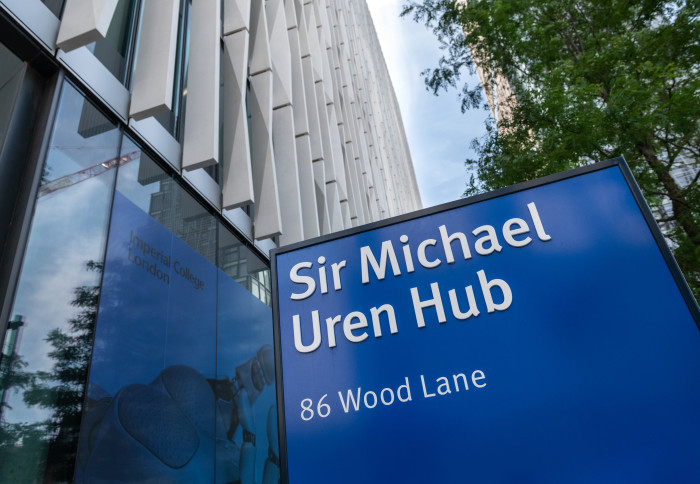
A major new research facility in White City will drive advances in life-changing medical technologies and treatments.
The Sir Michael Uren Hub – one of the world’s most significant centres for biomedical engineering – opens at Imperial College London’s White City Campus today.
The state-of-the-art facility was made possible by a £40 million gift from Sir Michael Uren OBE and his foundation, the most generous gift in the College’s history.
It was opened by Minister for Science, Research and Innovation George Freeman MP with Imperial’s Provost Professor Ian Walmsley and a representative from the Michael Uren Foundation.
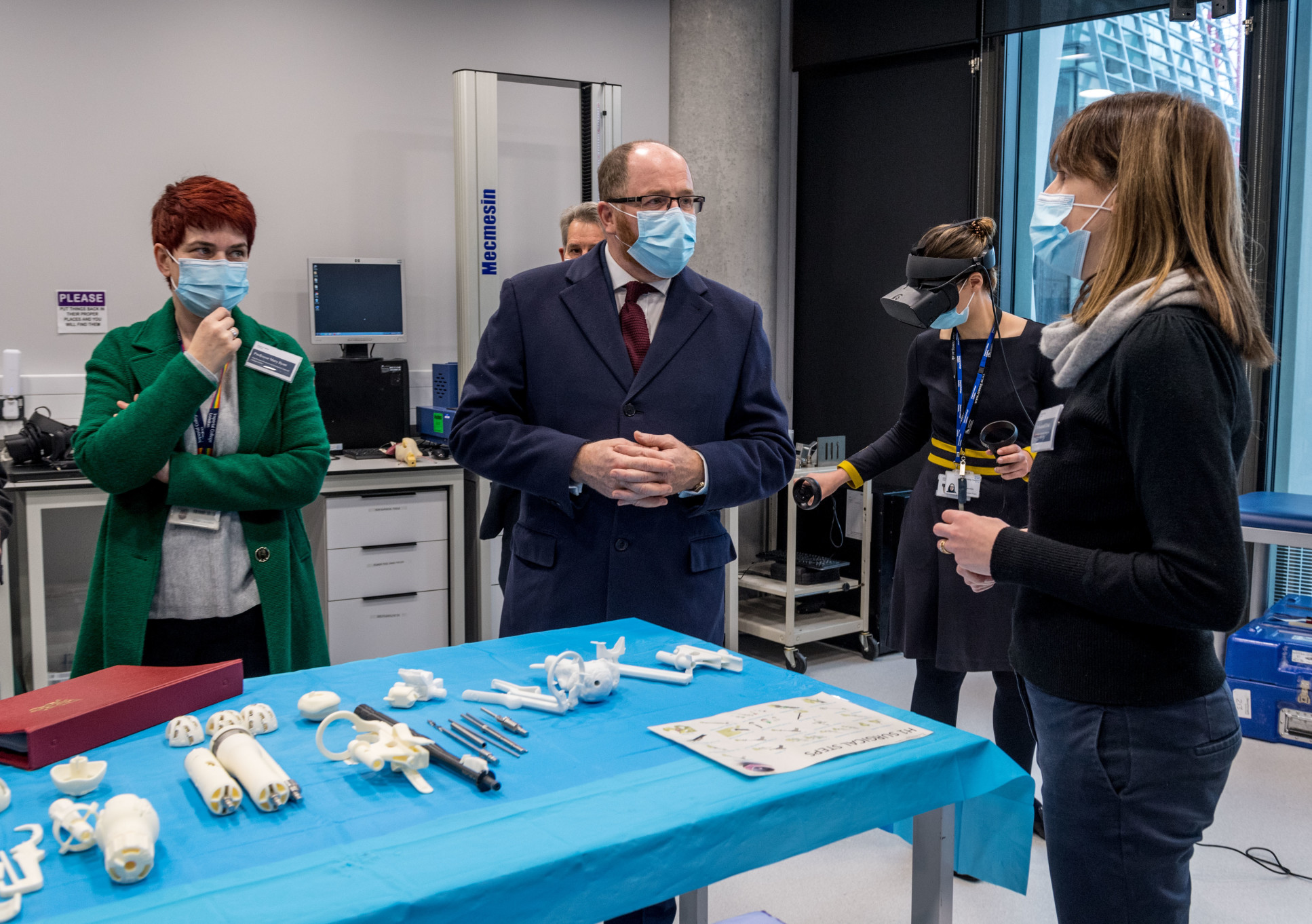
Collaborative facility
By translating life-changing research into new and affordable medical technology we will improve patient care for generations to come. Professor Alice Gast President of Imperial College London
Designed as a multidisciplinary collaborative facility, the Sir Michael Uren Hub provides space for Imperial’s world-leading researchers, engineers, scientists and clinicians to work alongside one another to tackle biomedical and healthcare problems.
The Hub will bring together over 500 engineers, clinicians, and scientists to develop new and affordable medical technologies. They will combine the latest medical research and engineering to improve the treatment and diagnosis of diverse medical conditions, from finding ways to treat dementia to creating bionic limbs.
Life-changing research
Professor Alice Gast, President of Imperial College London, said: “This landmark building enables our researchers, engineers, scientists and clinicians to work side by side to address some of the most pressing biomedical and healthcare problems of our time. By translating life-changing research into new and affordable medical technology we will improve patient care for generations to come.
“The building, made possible only through Sir Michael’s remarkable gift, will stand as a testament to his vision and generosity.”
"This cluster of expertise and collaboration across disciplines and sectors is truly world-class." George Freeman MP Minister for Science, Research and Innovation
The 13-storey building includes state-of-the-art laboratory and office facilities for the next generation of biomedical engineering research focused on a variety of technologies and applications. Housing interdisciplinary research initiatives from across Imperial’s departments and faculties, the building will take medical innovations from the lab to the wards, benefitting from its proximity to the College’s Hammersmith Hospital campus. Turning ideas into commercial ventures is promoted by the adjacent Translation and Innovation Hub (IHUB).
George Freeman MP, Minister for Science, Research and Innovation said: "The Sir Michael Uren Hub at Imperial’s White City Campus puts the UK at the forefront of some of the most important scientific and technological challenges of the 21st century. This cluster of expertise and collaboration across disciplines and sectors is truly world-class."
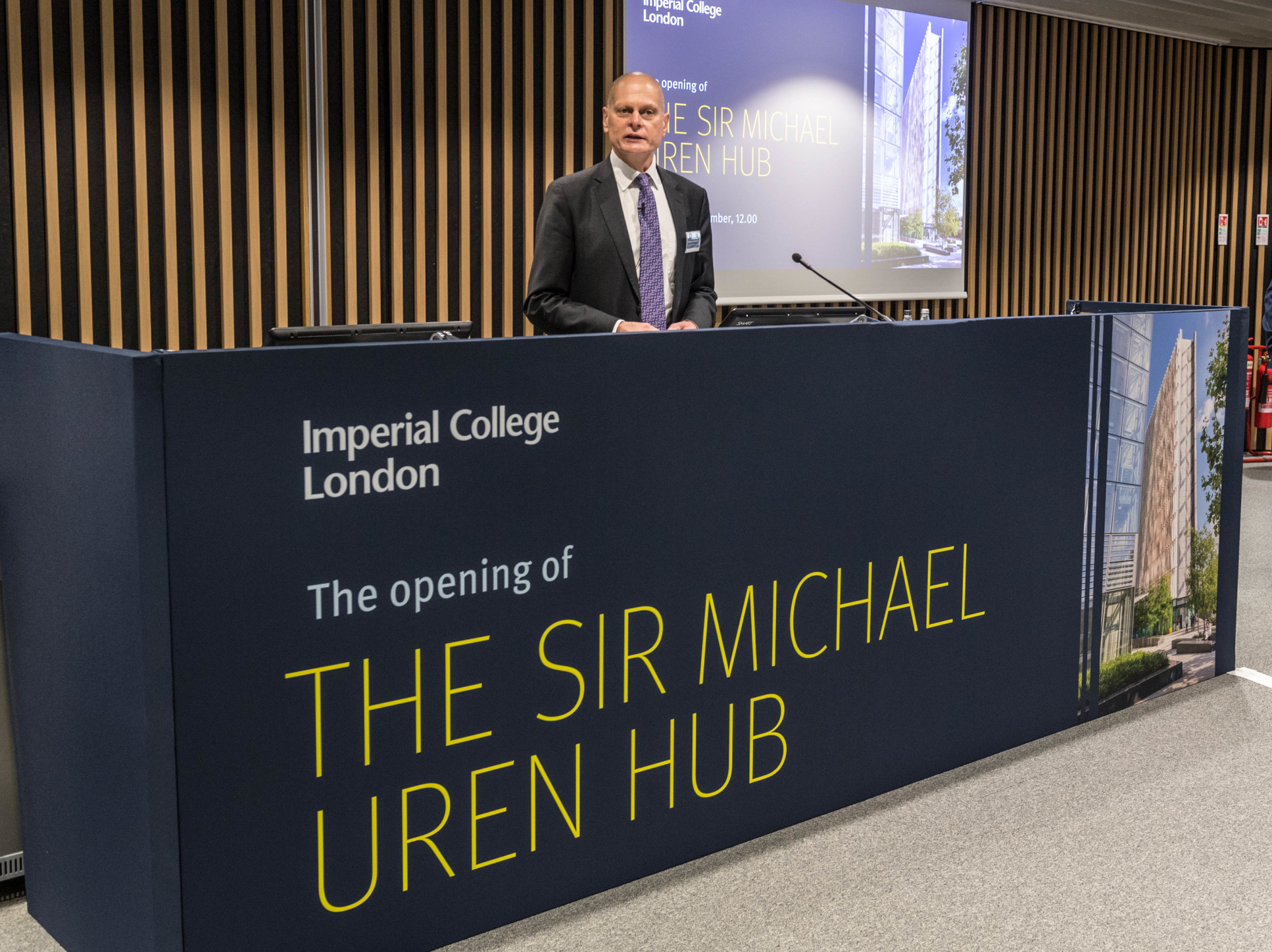
Speaking at the launch of the Hub, Imperial's Provost Ian Walmsley, said: "The Sir Michael Uren Hub is our new home for more than 500 engineers, clinicians and scientists working across disciplinary boundaries to enable improved care for patients with a broad range of conditions from arthritis to dementia. The Hub has created a new focal point for health research in London.
"The Hub is a real testament to the catalysing impact of philanthropy, not just in terms of the building itself, but in the way it will enable new ways of working, new approaches to problems and new relationships that different groups have been able to build within the building.
"Sir Michael's gift is the largest in Imperial's history and will deliver significant impact that will be felt for generations to come."
Leading air pollution centre
The building houses the School of Public Health’s Environmental Research Group, the world’s leading centre for the study of air pollution. Led by Professor Frank Kelly, the Battcock Chair in Community Health and Policy, the group combines air pollution science, toxicology and epidemiology to determine the impacts of air pollution on health and the causal factors.
The group’s research covers a wide variety of themes related to environmental pollution and its impact on human health, from aerosol science and environmental toxicology, to modelling and microplastics.
One of the group’s projects designed to expand our knowledge of the state of air quality is the West London Healthy Home and Environment Study (WellHome). Working in partnership with the local community, a team led by Professor Kelly will follow 100 households in West London to examine the quality of air inside and outside the home. The four-year research project was funded by UKRI through the SPF Clean Air Programme to better understand how the composition, concentration and exposures of air pollutants affect children with asthma and people living in urban environments.
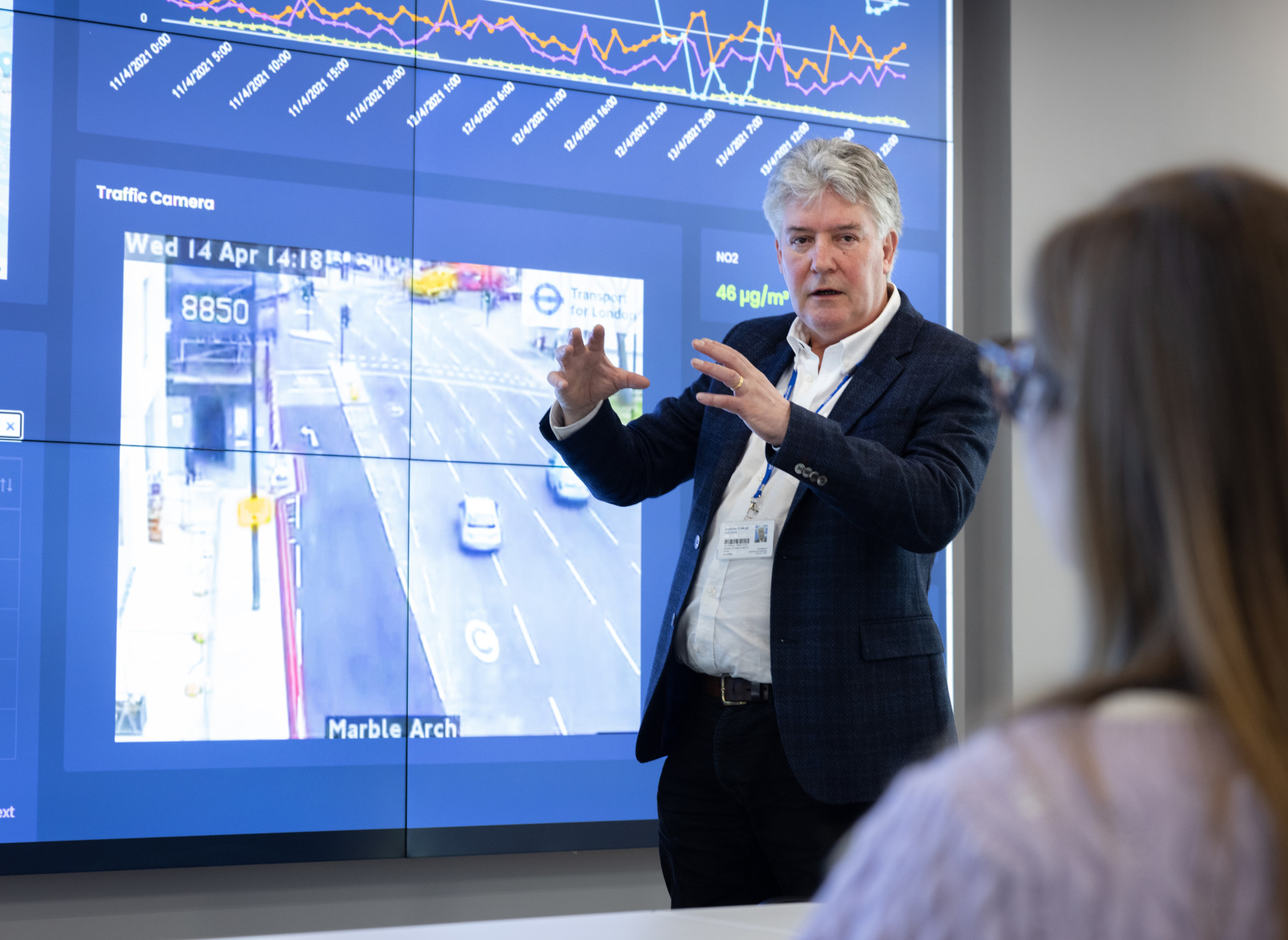
Understanding musculoskeletal health
One of the facilities based in the building is the MSk Lab, comprising a team of over 30 full-time surgeons, physiotherapists, scientists and engineers all seeking to understand musculoskeletal health and degeneration, and to prevent and treat a wide array of problems associated with impaired mobility. The MSk Lab aims to improve the clinical outcomes of patients undergoing joint replacement surgery – and reduce the costs of treatments – by developing and using new tools and technologies, improving rehabilitation methods and pioneering improved surgical training and techniques. The MSk Lab is directed and led by Professor Justin Cobb and Professor Alison McGregor from the Department of Surgery and Cancer.
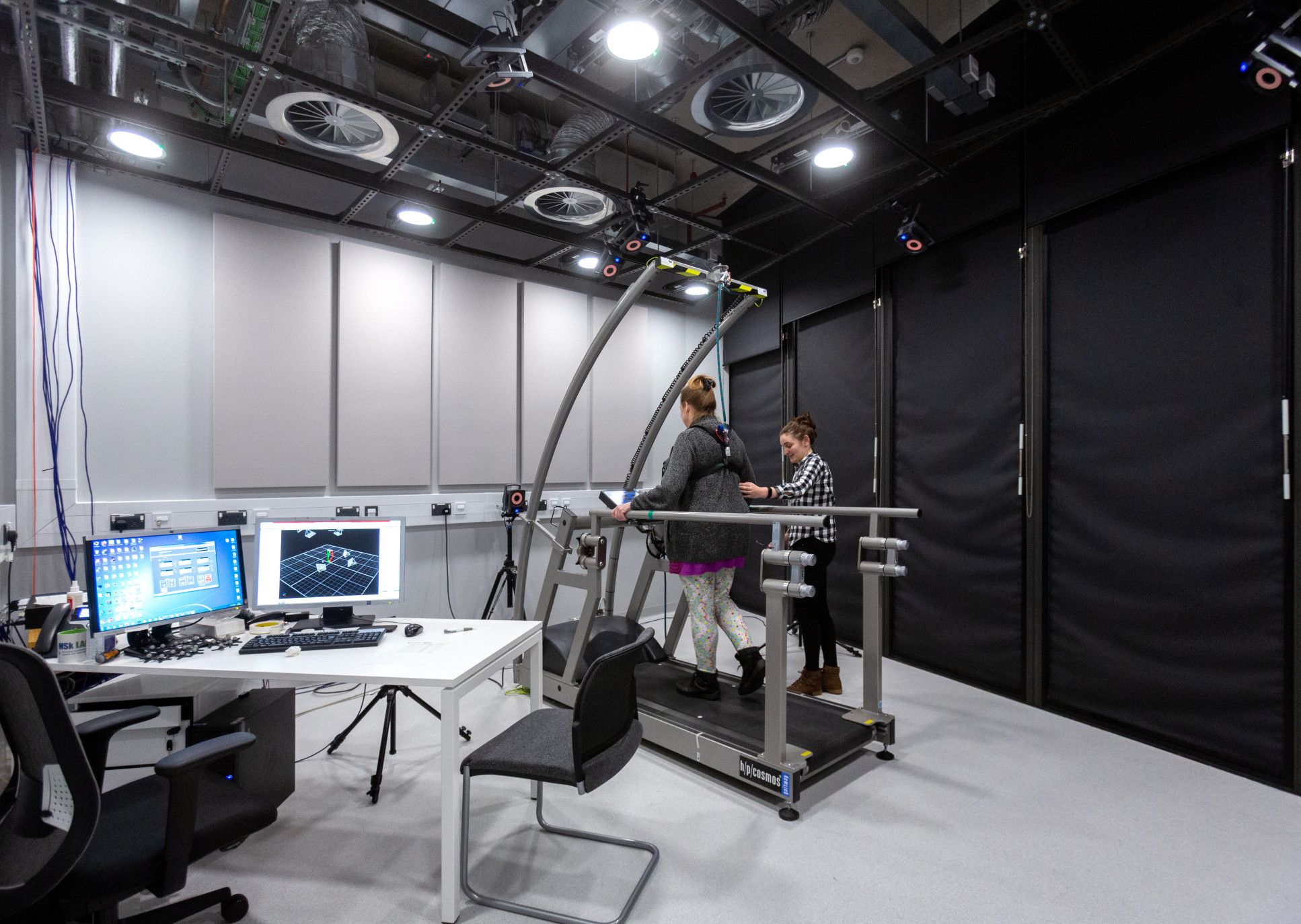
The building will also host the Musculoskeletal Medical Engineering Centre (MSk MEC) which unites researchers across the College to discover and develop medical engineering solutions for musculoskeletal disorders, such as osteoarthritis. The Centre’s membership includes over 100 researchers across different technology and application themes and represents a strong and diverse interdisciplinary collaboration of engineers, scientists and clinicians.
Proud Imperial alumnus
A proud Imperial alumnus (Mechanical Engineering and Motive Power, 1943), Sir Michael Uren is the most generous benefactor in the College’s history. His philanthropy includes the £40 million gift to create the Sir Michael Uren Hub, among other very significant support for medical research.
Speaking in 2017 at the building's groundbreaking ceremony, Sir Michael said: “Imperial College London is an inspirational place. I was inspired when I joined in September 1940 and I am inspired here today.
“My vision is that in building this research centre a few miles from the City of London – which itself has become a financial centre of the world – investment will be watching and waiting for the research and inventions that will be developed here, which will trigger tomorrow’s great companies.”
Thriving research community
The Uren Hub forms a key part of the White City Campus, where the College is creating a unique enterprise and innovation ecosystem, supporting enterprising talented staff and students to move from multi-disciplinary cutting-edge research to ideation and incubation settings with tailored support at every stage.
The Campus houses the I-HUB, providing fully fitted and bespoke lab and office space to accommodate commercial R&D activities. It is also home to the White City Incubator, Imperial's hub for growing deep science startups, and the Molecular Sciences Research Hub (MSRH), the new home for the Department of Chemistry in White City.
A new 200,000 sq ft scaleup facility opened last year – Scale Space – is home to over 20 companies, and represents a joint venture between Imperial and leading digital venture builder Blenheim Chalcot. Scale Space-based companies benefit from high-quality academic input, targeted scaleup services and tailor-made facilities to accelerate growth and job creation.
A new School of Public Health has recently begun construction at White City and will amplify work in four key areas: World Health, Life-long Health, Community Health and Policy, and Children’s Health and Wellbeing. The new multidisciplinary building will provide collaborative, flexible, and interactive spaces for academics, collaborators, students and the local community, and house state-of-the-art facilities to support modern advances in genomics, data sciences, community engagement, incubators, and educational facilities.
The College’s facilities at White City – spanning ideation, hackspace, incubation, acceleration and business growth – offer students, researchers and businesses the opportunity to work alongside at every stage of development. Together, we are nurturing the skills and confidence to turn ideas into real products and services that can transform industries, change lives and ultimately tackle global challenges.
Watch key highlights from the opening event on 6 December 2021
Article text (excluding photos or graphics) © Imperial College London.
Photos and graphics subject to third party copyright used with permission or © Imperial College London.
Reporter
Thomas Angus [Photographer]
Communications Division
Joanna Wilson
Communications Division
